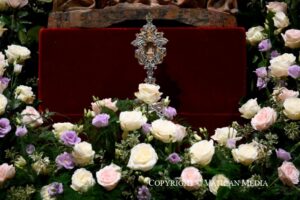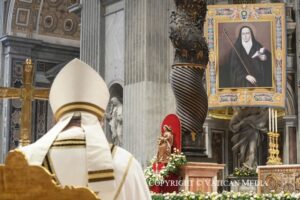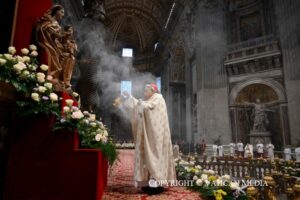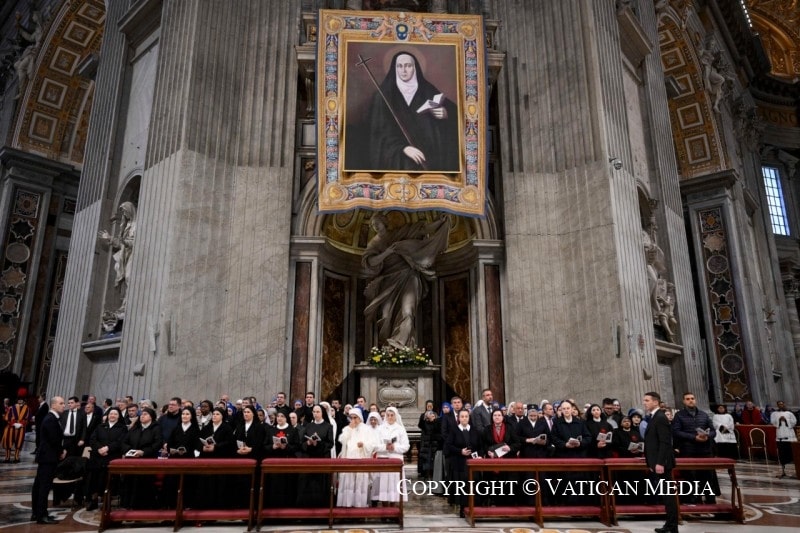At 9.30 this morning, the VI Sunday of Ordinary Time, in the Vatican Basilica, the Holy Father Francis presided over the Eucharistic Celebration and the Rite of Canonization of Blessed Maria Antonia de San José de Paz y Figueroa (1730–1799), Founder of the house of spiritual exercises in Buenos Aires. Present at the Holy Mass was the President of the Republic of Argentina, whom the Holy Father greeted first and after the rite, he subsequently left the Basilica.
We publish below the homily that the Pope gave after the proclamation of the Gospel:
Homily of the Holy Father
The first reading (cf. Lev 13:1-2.45-46) and the Gospel (cf. Mk 1:40-45) speak of leprosy: a disease that involves the progressive physical deterioration of the person and which, tragically, even today, in some places causes people to be treated as outcasts. Leprosy and ostracism. These are the ills from which Jesus wanted to liberate the man whom he encounters in the Gospel. Let us take a look at his situation.
That leper was forced to live outside the city. Weakened by his illness, rather than being helped by his fellow citizens, he finds himself forsaken and indeed further wounded by ostracism and rejection. Why? First, because of fear, fear of catching the disease and meeting the same end: “God forbid that it happen also to us! Let us not take a risk, but keep our distance!” Fear. Then, prejudice: “If he has this terrible illness” – for so people thought – “surely it is because God is punishing him for some sin he committed; so he deserves it after all!”

Fear, prejudice and false religiosity. These are three causes of a great injustice. Three “leprosies of the soul” that cause the weak to suffer and then be discarded like refuse. Brothers, sisters, let us not think that these are only relics of the past. How many suffering men and women do we meet on the sidewalks of our cities! And how many fears, prejudices and inconsistencies, even among those who are believers and call themselves Christians, continue to wound them all the more! In our time too, there are striking cases of ostracism, barriers needing to be torn down, forms of “leprosy” to be cured. But how? How can we do it? What does Jesus do? He does two things: he touches and he heals.

Are we, who love and follow Jesus, capable of imitating his “touch”? That is not easy to do, and we must be on guard lest our hearts harbour instincts contrary to his attitude of “drawing near” and “being a gift” to others. As, for example, when we withdraw from others and think only of ourselves; when we reduce the world around us to the limits of our own “comfort zone”; when we believe that the problem is always and only other people… In such cases, we need to be attentive, for the diagnosis is clear: a “leprosy of the soul”: a sickness that blinds us to love and compassion, one that destroys us by the “cankers” of selfishness, prejudice, indifference and intolerance. Let us also be attentive, brothers and sisters, since, as with the first signs of leprosy that appear on the skin, if we do not intervene immediately, the infection will grow and become devastating. In the face of this danger, this possible sickness in our souls, we ask ourselves if there is a cure?

At the “touch” of Jesus, the very best of ourselves is born anew: the tissues of our heart regenerate; the blood of our creative impulses, charged with love, begins once more to flow; the wounds of our past mistakes heal and the skin of our relationships becomes fresh and healthy. The beauty that we possess, the beauty that we are, is restored. Thanks to the love of Christ, we rediscover the joy of giving ourselves to others, without fears and prejudices, leaving behind a dull and disembodied religiosity and experiencing a renewed ability to love others in a generous and disinterested way.
Then, as a magnificent page of the Scriptures tells us (cf. Ez 37:1-14), from what appeared to be a valley of dry bones, living bodies rise up and a community of brothers and sisters is reborn and saved. Yet it would be illusory to think that this miracle takes place in grandiose and spectacular ways. It happens most often in the hidden charity practiced each day in our families, at work, in the parish and at school, on the streets, in our offices and stores. A charity that does not seek publicity and has no need of applause, since love is sufficient unto itself (cf. SAINT AUGUSTINE, Enn. in Ps. 118, 8, 3). Jesus makes this clear today, when he orders the man, now healed, to “say nothing to anyone” (v. 44): closeness and discretion. Brothers and sisters, that is how God loves us, and if we allow ourselves to be touched by him, we too, with the power of his Spirit, will be able to become witnesses of his saving love!











